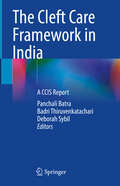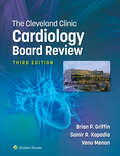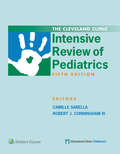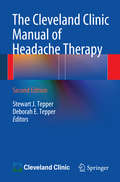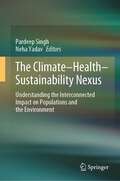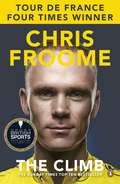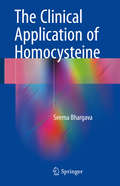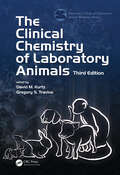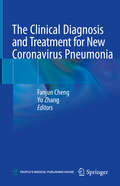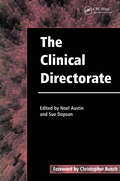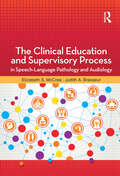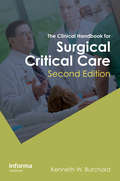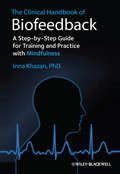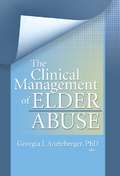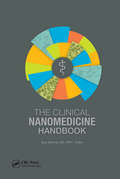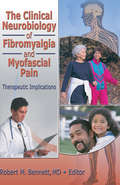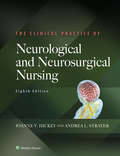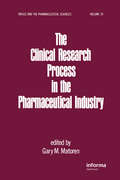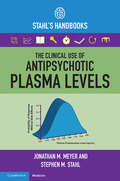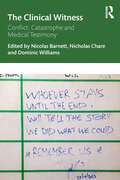- Table View
- List View
The Clear Skin Cookbook: The vital vitamins and magic minerals you need for smooth, blemish-free, younger-looking skin
by Dale PinnockFrom Dale Pinnock, aka the Medicinal Chef, comes his fully updated and revised The Clear Skin Cookbook, which shows that we can all increase the appearance and overall radiance of our skin, simply by eating the right foods and incorporating a variety of macronutrients into our diets. This full colour cookbook is the definitive guide to understanding your skin's health and rejuvenating its youthfulness.Packed with mouth watering recipes - for breakfasts, soups, starters, mains, desserts, snacks and drinks - you will soon discover how easy it is to choose and prepare dishes that are not only tasty but which also enhance skin healing and help to combat the effects of ageing. The Medicinal Chef reveals the vital vitamins and magic minerals in everyday ingredients, which can maintain optimum skin health. The book includes help for all common skin conditions, from acne and eczema to psoriasis.
The Cleft Care Framework in India: A CCIS Report
by Panchali Batra Badri Thiruvenkatachari Deborah SybilThe Cleft Care India study (CCIS) comprehensively evaluates the treatment and care provided to patients with non-syndromic unilateral cleft lip and palate (UCLP) in India, at five, twelve, and twenty years of age. This book is a culmination of the CCIS project funded by the Ministry of Human Resource Development, Government of India under the Scheme for Promotion of Research and Academic Collaboration (SPARC), and the UK-India Education and Research Initiative (UKIERI). The University of Manchester, the UK's preeminent hub for creating and overseeing Cleft care, is the international partner with Jamia Millia Islamia, India, for this project. The journeys, experiences, and methods used by India's paramount cleft centers to get to where they are now are compiled in this monograph. It provides detailed information on the services, team, and overall excellence of various healthcare facilities; empowering readers locate and evaluate the top-performing medical centers in their region. The target audience would be any person associated with cleft care. This monograph would be a valuable resource for academicians, policymakers, and healthcare professionals to develop robust strategies for comprehensive cleft care.
The Cleveland Clinic Cardiology Board Review
by Brian P. Griffin Samir R. Kapadia Venu MenonProviding a comprehensive, state-of-the-art review of every area of contemporary cardiovascular medicine, The Cleveland Clinic Cardiology Review is an excellent tool for learning and reviewing key concepts in major areas of cardiology. The ThirdEdition contains fully revised content, review questions used on the board exam. A new, easy-to-follow chapter template facilitates quick review and retention of the material.
The Cleveland Clinic Intensive Review of Pediatrics
by Camille Sabella Robert J. CunninghamReview for the pediatric boards with confidence! The Cleveland Clinic Intensive Review of Pediatrics, 5th Edition, provides the core pediatric material you need to know in a practical format ideal for board review and preparation. Up-to-date subspecialty chapters provide concise overviews with bulleted lists, tables, photographs, and radiographs, as well as new multiple-choice questions with detailed rationales. Board simulation chapters in every section and at the end of the book, along with three practice exams, build your test-taking skills.
The Cleveland Clinic Manual of Dynamic Endocrine Testing
by Ahmet Bahadir Ergin A. Laurence Kennedy Manjula K. Gupta Amir H. HamrahianDeveloped via a peer review process that included 25 experienced endocrinologists and utilizing the best current evidence, The Cleveland Clinic has created a practical set of protocols for over 25 commonly used dynamic endocrine tests. The cornerstone of clinical endocrinology, these evidence-based protocols play an important role in clinical decision-making and are important element of billing and compliance with high quality standards. Included here are various tests for pituitary and adrenal disorders, thyroid disorders, and glucose metabolism and pancreatic disorders, presented systematically with indications, preparation, materials needed, precautions, procedure, interpretation, and caveats. Filling the gap left by a lack of national guidelines, The Cleveland Clinic Manual of Dynamic Endocrine Testing is an up-to-date practical guide for endocrinologists, nurses, and their staff, inside or outside of the US, who need to perform and interpret dynamic endocrine testing in their everyday practice, as well as medical students, residents and fellows who have interest in endocrinology.
The Cleveland Clinic Manual of Headache Therapy
by Deborah E. Tepper Stewart J TepperThe Cleveland Clinic Manual of Headache Therapy is a hands-on, practical guide to diagnosis, work-up, and treatment of common headache disorders. Each chapter is written by a Cleveland Clinic Headache Center care provider. The book uses an evidence-based approach to sift through the wealth of available data and identify the most appropriate treatments. This manual is aimed at practicing neurologists and pain specialists, fellows and residents, and also primary care physicians. The Cleveland Clinic Manual is the most trusted source on this ever expanding and developing topic.
The Climate-Health-Sustainability Nexus: Understanding the Interconnected Impact on Populations and the Environment
by Neha Yadav Pardeep SinghIn a compelling scholarly journey, this book unfolds the intricate narratives of human progress and its environmental repercussions catalyzed by the Industrial Revolution. It thoughtfully contrasts the exploitative environmental ideologies stemming from colonization and industrialization against the profound yet often marginalized indigenous ecological philosophies, urging a pivotal shift in environmental stewardship. The narrative meticulously traces the arc of scientific discovery and environmental policy evolution, from Eunice Foote’s groundbreaking hypothesis on the greenhouse effect to the landmark achievements of the Paris Agreement, encapsulating over a century of environmental activism and scholarly debate. The discourse extends beyond traditional environmental concerns, exploring the intersection of climate change with public health, food security, and gender disparities, underscoring the urgency of sustainable agricultural practices and the pivotal role of women in food systems. It introduces the transformative potential of digital health innovations and renewable energy technologies as crucial tools in climate mitigation, highlighting the need for an integrated socio-technical governance model that includes community resilience and biopsychosocial health. The book critically addresses the dynamics of climate finance, advocating for inclusive green growth through strategic renewable energy investments, and revisits the ‘Tragedy of the Commons’ to challenge conventional views on communal resource management. It advocates for a justice-oriented approach to tackling the multifaceted environmental, social, and economic challenges, with a particular lens on the adverse impacts borne by marginalized communities in the Global South. Furthermore, it explores the untapped potential of wild genetic resources in bolstering food security. It aligns with the United Nations’ Sustainable Development Goals, advocating for integrating Indigenous wisdom into urban development strategies. This book is a call to action, serving as a comprehensive scholarly examination that addresses the multifaceted challenges of climate change, health, and sustainability and champions a collective approach towards forging a sustainable and equitable future.
The Climb: The Autobiography
by Chris FroomeOn 26th July 2015, Chris Froome entered the record books. He won cycling's ultimate race - the Tour de France - for the second time.Taking a double Yellow Jersey was a staggering achievement. This memoir shows just how remarkable it was, given the uphill struggle Froome faced. Growing up in Kenya, biking down mile after mile of dusty road, and staying in a humble tin hut, he developed a fierce passion and determination to win.The road to Europe was long, gruelling and filled with setbacks - but it prepared him for teamwork as a domestique and then the leap to leader of Team Sky and a shot at winning the Tour de France. In The Climb, written with the renowned investigative reporter David Walsh, he vividly recounts the struggles, the rivalries, the battles, the comebacks. Finally he traces his path to triumph and his mission to help clean up cycling.Inspiring and exhilarating, it will leave you ready to face your own challenges in life, whatever they may be.'Engaging, vividly evoked' Mail on Sunday, Books of the Year'What Chris has done is phenomenal' Sir Chris Hoy
The Clinical Anaesthesia Viva Book
by Julian M. Barker Simon L. Maguire Simon J. Mills Abdul-Ghaaliq Lalkhen Brendan Mcgrath Hamish ThomsonThe second edition of the hugely popular The Clinical Anaesthesia Viva Book builds on the success of the first by providing a thorough review of short and long case questions typically given to Final FRCA viva candidates. An introductory chapter gives invaluable practical advice on preparation for the viva. This is followed by almost 100 short cases and 25 long cases, all based on viva questions posed at recent examinations. Answers have been constructed from a combination of popular textbooks, recent publications and the extensive practical experience of the authors. Short further reading lists are provided for more in-depth preparation. Written by a team of expert consultants and senior trainees with (successful!) experience of the Final FRCA, this second edition of The Clinical Anaesthesia Viva Book, is a must-have for anyone preparing for the Final FRCA viva.
The Clinical Anatomy of the Vascular System
by Marios Loukas R. Shane Tubbs Joe Iwanaga Stephen J. Bordes Jr.This multidisciplinary book provides an in-depth review of the human vascular system with emphasis on anatomy, embryology, pathology, and surgical features. Arteries, veins, and lymphatics are each assigned chapters that discuss their relevant anatomy, topography, embryology, histology, imaging, pathology, surgical significance, and complications. The comprehensive text was written and edited by leading experts in the field and is ideal for surgeons, proceduralists, anatomists, trainees, and students. Informative chapters are sectioned according to their part of the body.
The Clinical Application of Homocysteine
by Seema BhargavaThis book helps clinicians to optimally and appropriately utilize homocysteine levels in the diagnosis, prediction and management of and research into vascular disease and many other conditions. It also familiarizes readers with the pathophysiology and clinical implications of hyperhomocysteinemia. Laboratory investigations are gaining importance in the diagnosis and prognosis of patients, and as such, scientists and laboratorians are constantly attempting to identify new markers that will help in earlier diagnosis and better prognostication of conditions with high morbidity and mortality, as well as high prevalence. According to the WHO, developing countries are home to 80% of patients with coronary artery disease (CAD) and stroke – conditions with a mortality second only to cancer. Intensive research in these areas has resulted in the identification of homocysteine (declared the ‘marker of the millennium’) and several new markers for the diagnosis and prediction of CAD and stroke. The book is a valuable resource for clinicians and consultants in practice, as well as for postgraduate and undergraduate students of medicine, biotechnology and biochemistry.
The Clinical Chemistry of Laboratory Animals
by David M. Kurtz Gregory S. TravlosKey features: Serves as the detailed, authoritative source of the clinical chemistry of the most commonly used laboratory animals Includes detailed chapters dedicated to descriptions of clinical chemistry-related topics specific to each laboratory species as well as organ/class-specific chapters Presents information regarding evaluation and interpretation of a variety of individual clinical chemistry end points Concludes with detailed chapters dedicated to descriptions of statistical analyses and biomarker development of clinical chemistry-related topics Provides extensive reference lists at the end of each chapter to facilitate further study Extensively updated and expanded since the publication of Walter F. Loeb and Fred W. Quimby’s second edition in 1999, the new The Clinical Chemistry of Laboratory Animals, Third Edition continues as the most comprehensive reference on in vivo animal studies. By organizing the book into species- and organ/class-specific chapters, this book provides information to enable a conceptual understanding of clinical chemistry across laboratory species as well as information on evaluation and interpretation of clinical chemistry data relevant to specific organ systems. Now sponsored by the American College of Laboratory Animal Medicine (ACLAM), this well-respected resource includes chapters on multiple laboratory species and provides pertinent information on their unique physiological characteristics, methods for sample collection, and preanalytical sources of variation for the particular species. Basic methodology for common procedures for each species is also discussed. New Chapters in the Third Edition Include: The Laboratory Zebrafish and Other Fishes Evaluation of Cardiovascular and Pulmonary Function and Injury Evaluation of Skeletal Muscle Function and Injury Evaluation of Bone Function and Injury Vitamins Development of Biomarkers Statistical Methods The Clinical Chemistry of Laboratory Animals, Third Edition is intended as a reference for use by veterinary students, clinical veterinarians, verterinary toxicologists, veterinary clinical pathologists, and laboratory animal veterinarians to aid in study design, collection of samples, and interpretation of clinical chemistry data for laboratory species.
The Clinical Diagnosis and Treatment for New Coronavirus Pneumonia
by Yu Zhang Fanjun ChengThis book is a practical manual for anti-COVID-19. It is not only with the reference to the result of modern medical science, patients’ situation, but also take the deployment of medical resources into consideration. Content of this manual includes: Medical administration under emergent circumstances, protection and control of hospital infection, clinical practice guidance for diagnosis and therapy, the application of radiation for the examination, laboratory diagnosis, inhabitation of inflammatory cytokines crisis, plasma of patient in the recovery stage, and traditional Chinese medical science etcetera.Authors are from Union hospital, Tongji medical college in Wuhan city, who has first-hand experiences. This book is a collection and fusion of such experiences in fighting against epidemic infectious disease. It is a timely book for doctors who are fighting against COVID-19.
The Clinical Directorate
by Noel Austin Sue Dopson* A practical introduction to the business of management for doctors and managers at all levels * This simple guide provides easy-to-use tools and techniques * It explains jargon presents managerial tasks in context and provides managerial models
The Clinical Education and Supervisory Process in Speech-Language Pathology and Audiology
by Elizabeth McCrea Judith BrasseurAs with the actual practices of speech-language pathologists and audiologists, clinical education and supervision practices work best when they are grounded not only in concept and theory but also in research. Designed to act as a complete guide to both the theory and the research, The Clinical Education and Supervisory Process in Speech-Language Pathology and Audiology provides the most up-to-date information on these crucial topics. Following in the footsteps of their mentor, Jean Anderson, Drs. Elizabeth McCrea and Judith Brasseur have taken on the task of assembling important current research and best practices in clinical education and supervision into one comprehensive resource. With their prestigious team of contributing authors, this text represents the culmination of decades of study and real-world best practices.The Clinical Education and Supervisory Process in Speech-Language Pathology and Audiology covers clinical education and supervision across five unique constituent groups: clinical educators of graduate students, preceptors of audiology externs, mentors of clinical fellows, supervisors of support personnel, and supervisors of professionals transitioning between work settings. It also includes the latest information on certification and accreditation requirements for preparation in supervision.Topics include Foundations: Anderson’s Continuum of Supervision Components of the Process Expectations for Supervision Practical Research in Supervision Literature from other Disciplines Obtaining Feedback About the Supervisory Process The Ethics of Clinical Education and Supervision Supervisor Self-Study and Accountability Interprofessional Education and Practice in Clinical Education and Supervision Chapter appendices add numerous ancillary materials, allowing readers to easily adopt the most successful processes and strategies the research has revealed. Sample scripts of supervisory conferences, self-assessment tools, action plan tools, and analysis systems can all be found inside.The Clinical Education and Supervisory Process in Speech-Language Pathology and Audiology is intended as a primary resource for anyone in those professions in any setting who is engaged in the process of clinical education and supervision. With this text as their guide, clinical educators and supervisors will be able to ground their practices in the vast compiled research and study contained within.
The Clinical Handbook for Surgical Critical Care
by K. W. BurchardThe Clinical Handbook for Surgical Critical Care, Second Edition covers all aspects of acute and emergency care for the critically ill or injured patient who may be in the ICU and/or CCU. This new edition is separated into chapters by organ systems, and takes a look at the critical disease states associated with these organs. All chapters follow th
The Clinical Handbook of Biofeedback
by Inna Z. KhazanA practical guide to the clinical use of biofeedback, integrating powerful mindfulness techniques.A definitive desk reference for the use of peripheral biofeedback techniques in psychotherapeutic settings, backed by a wealth of clinical researchIntroduces mindfulness and acceptance techniques and shows how these methods can be incorporated into biofeedback practiceStep-by-step instructions provide everything a clinician needs to integrate biofeedback and mindfulness including protocols, exemplar logs for tracking symptoms, and sample scripts for mindfulness exercisesIncludes scientifically robust treatment protocols for a range of common problems including headaches, hypertension and chronic pain
The Clinical Interview of the Child
by Stanley I. Greenspan Nancy Thorndike GreenspanIdeal for both novices and advanced practitioners, the new edition of Stanley Greenspan's classic guide outlines a practical process for observing and interviewing children -- and organizing and interpreting their unfolding communications. The third edition has been expanded and revised extensively, with updated theoretical and conceptual foundations; information on higher levels of ego development and reflective and thinking capacities of older children; and a new section on a developmental biopsychosocial model -- the developmental, individual-difference, relationship-based (DIR) approach. An invaluable educational and practical resource, The Clinical Interview of the Child, Third Edition, is an ideal tool for psychiatrists and psychologists, pediatricians, educators, social workers, speech pathologists, occupational therapists, and judges and attorneys dealing with children and families.
The Clinical Management of Elder Abuse
by Georgia J AnetzbergerLearn to detect elder abuse-and provide the help that your neglected or abused elderly clients need! Even to clinicians experienced in managing difficult client situations, elder abuse is perplexing, complex, and ethically charged. This kind of abuse can be hard to detect, with its subtle manifestations and indicators that could just as easily reflect other problems or illnesses. It can seem impossible to control, particularly when the victim refuses help or denies the seriousness of mistreatment. Moreover, decision-making when dealing with interventions for elder abuse is rarely easy and is frequently clouded by ethical dilemmas. The Clinical Management of Elder Abuse can help. This essential guide for present and future clinicians provides you with multidisciplinary perspectives on detecting elder abuse situations and interventions that can make a real difference in the lives of clients. Three case studies are presented and then examined from the professional perspectives of an attorney, a physician, a nurse, and a social worker. What these professionals have to say will leave you better informed about the dynamics and complexities of elder abuse, about important steps that must be taken in the clinical management of elder abuse, and about the importance and application of multidisciplinary teams in elder abuse work. The handy figures, lists of definitions, and tables you&’ll find in this well-referenced book make important concepts and complex information easy to access and understand. The Clinical Management of Elder Abuse shows how professionals in the above disciplines can address the effects of elder abuse, which may manifest as: physical effects, including pain and injury, sleep disturbances, eating problems, and headaches behavioral effects, including anger, helplessness, reduced coping abilities, and suicidal actions psychological effects, which can be wide-ranging and include denial, fear, anxiety, and depression social effects, such as increased dependence, withdrawal, and lessened contact with the outside world As the baby boom generation ages, incidents of elder abuse are certain to continue to increase. Whether you are a student, an educator, an experienced clinician, or a novice in the field, The Clinical Management of Elder Abuse is a resource that you&’ll return to again and again as you work to improve the lives of this important, growing population.
The Clinical Nanomedicine Handbook
by Sara BrennerDesigned to foster a stronger awareness and exploration of the subject by practicing clinicians, medical researchers and scientists, The Clinical Nanomedicine Handbook discusses the integration of nanotechnology, biology, and medicine from a clinical point of view. The book highlights relevant research and applications by specialty; it examines nan
The Clinical Neurobiology of Fibromyalgia and Myofascial Pain: Therapeutic Implications
by Robert M. BennettIs chronic fatigue syndrome an early process of muscle aging? Is fibromyalgia a central pain state? This book covers the latest developments in pain research as presented at the Fifth World Congress on Myofascial Pain (MYOPAIN 2001). It examines the results of a wide scope of basic and applied research on soft-tissue pain, with a strong focus on therapeutic approaches. Its three main sections explore the neurobiology of central sensitization, regional pain syndromes, and chronic widespread pain. In addition, this well-referenced book presents a fascinating chapter on the complex relationship between muscle pain and aging. Handy graphs, charts, and illustrations make the information easy to assimilate. The Clinical Neurobiology of Fibromyalgia and Myofascial Pain: Therapeutic Implications contains up-to-date information on: the brain?s reactions to states of persistent pain the physical aftermath of torture ways to define and address the emotional distress that commonly observed in chronic pain patients the mechanisms and manifestations of muscle hyperalgesia the pathophysiology of inflammatory muscle pain regional muscle pain syndromes state-of-the-art information on the pathophysiology of visceral pain and visceral-somatic pain representations a case study of a physical therapy approach to fibromyalgia using Myofascial trigger points the epidemiology of widespread pain and its development after injuries syndromes that share overlapping clinical features with fibromyalgia the connection between HPA dysfunction, ANS dysfunction, and fibromyalgia the plasticity of excitatory synaptic transmission in the spinal dorsal horn and its role in the pathogenesis of pain hypersensitivity how the central mechanisms of pain transmission relate to pharmacological systems that are responsible for generating central sensitization states what PET and MRI show us about the role that the cerebral cortex plays in the perception and modulation of pain
The Clinical Practice of Neurological and Neurosurgical Nursing
by Joanne V. HickeyBase your care of neurological patients on evidence-based best practices, with the completely updated, fully illustrated The Clinical Practice of Neurological and Neurosurgical Nursing , 8th Edition . This is the most current and comprehensive neuroscience nursing text, written to support you in the everyday high-level assessments, information processing and decision making required of the neurological nurse. A must-have for offering accurate, efficient care of adult/geriatric neuroscience patients, this is ideal for both beginning and advanced neuro nurses and nursing students.
The Clinical Research Process in the Pharmaceutical Industry (Drugs And The Pharmaceutical Sciences Ser. #19)
by Gary M. MatorenThis book examines the sequence of events and methodology in the industrial clinical research process; a reference for multidisciplinary personnel. It is the conceptual framework involving the philosophical, economic, political, historical, regulatory, planning, and marketing aspects of the process.
The Clinical Use of Antipsychotic Plasma Levels: Stahl's Handbooks (Stahl's Essential Psychopharmacology Handbooks)
by Stephen M. Stahl Jonathan M. MeyerClinicians recognize that monitoring psychotropic levels provides invaluable information to optimize therapy and track treatment adherence, but they lack formal training specifically focused on the use of plasma antipsychotic levels for these purposes. As new technologies emerge to rapidly provide these results, the opportunity to integrate this information into clinical care will grow. This practical handbook clarifies confusing concepts in the literature on use of antipsychotic levels, providing clear explanations for the logic underlying clinically relevant concepts such as the therapeutic threshold and the point of futility, and how these apply to individual antipsychotics. It offers accessible information on the expected correlation between dosages and trough levels, and also provides a clear explanation of how to use antipsychotic levels for monitoring oral antipsychotic adherence, and methods to help clinicians differentiate between poor adherence and variations in drug metabolism. An essential resource for psychiatrists, psychiatric nurse practitioners, and mental health professionals worldwide.
The Clinical Witness: Conflict, Catastrophe and Medical Testimony
by Nicholas Chare Dominic Williams Nicolas BarnettThis unique, interdisciplinary book critically examines the important roles that witness accounts from healthcare professionals have played in testifying to historical instances of genocide, mass killing, epidemic disease, and natural disaster over the past century. Knowledge and perceptions of many major disasters – natural and human-made – have been shaped by witness accounts provided by doctors, nurses, and other medical practitioners.Bookended by two key events in the modern history of medicine, the Holocaust and the COVID-19 pandemic, this original volume engages with topics, including the atomic bombing of Hiroshima and Nagasaki, the 2010 Haiti Earthquake, and the Korean War. Drawing on a multidisciplinary selection of leading scholars and healthcare practitioners and discussing a wide range of media, its emphasizes mental and physical health, highlights the ethical challenges and moral stresses these terrible events can pose, and assesses the ways in which the testimonies of healthcare professionals are qualitatively different from other forms of witness.This wide-ranging, volume explores issues and themes relevant to medical humanities, history of medicine, peace and conflict studies, narrative medicine, humanitarian healthcare, healthcare ethics, trauma studies and global health. It is an essential contribution for all healthcare practitioners, aid workers and academics interested in these fields.

